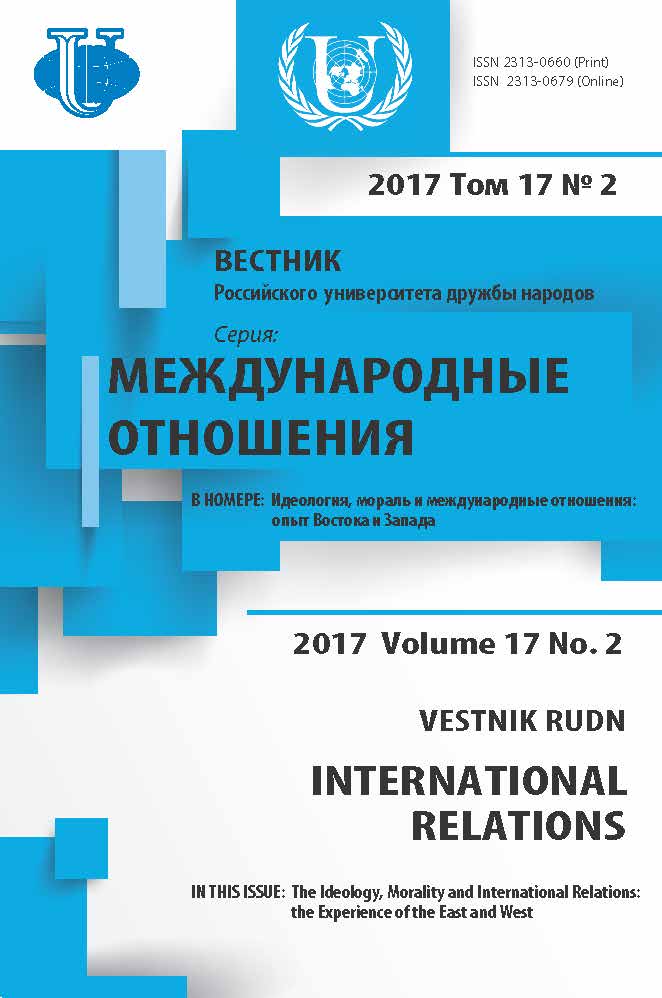Ethics of political responsibility in international relations
- Authors: Tsvyk A.V.1
-
Affiliations:
- Peoples' Friendship University of Russia (RUDN University)
- Issue: Vol 17, No 2 (2017): The Ideology, morality and international relations: the experience of the East and West
- Pages: 257-264
- Section: THEMATIC DOSSIER
- URL: https://journals.rudn.ru/international-relations/article/view/16061
- DOI: https://doi.org/10.22363/2313-0660-2017-17-2-257-264
- ID: 16061
Cite item
Full Text
Abstract
The article is devoted to the consideration of the moral factor in international relations. The author considers the issue of ethical evaluation of the responsibility of the actors of international relations in the ideas of a number of foreign and Russian thinkers of the 20th and 21st centuries. The author notes that the process of analysis of the ethics of responsibility in the framework of socio-political thoughts, as well as the mechanism of the impact of morality on international relations gives reasons to conclude that it is possible and necessary to specify the concept of “responsibility ethics”, which can be interpreted as “ethics of political responsibility” in the sphere of international relations and foreign policy. Thus, in the author’s point of view in the system of international relations there has emerged the most important category, which researchers characterize as the “ethics of political responsibility”. Relying on the idea of the Russian political scientist A.S. Kapto that the core of the “ethics of political responsibility” is a synthesis of political and moral responsibility, the author analyzes its structure and classification. The author comes to the conclusion that it is necessary to form the universal aspect of political responsibility among the actors of international relations.
About the authors
Anatoliy Vladimirovich Tsvyk
Peoples' Friendship University of Russia (RUDN University)
Author for correspondence.
Email: tsvyk_av@rudn.university
Moscow, Russia
References
- Kapto, A. S. (2011). Morality in the models of the world order. Moscow: Vostok-Zapad. (in Russ.).
- Kiung, G. (1997). World politics and World Ethics. In: Kul'tura mira i demokratiia. Moscow, pp. 123—125. (in Russ.).
- Machiavelli, N. (1990). The Prince. Moscow: Planeta. (in Russ.).
- Mannheim, K. (2000). Sociology of knowledge. Moscow — Saint Petersburg: Universitetskaia kniga. (in Russ.).
- Morgenthau, G. (1997). Politics among nations. Sotsial'no-politicheskii zhurnal, 2, 189—201. (in Russ.).
- Plato. (2015). The State. Saint Petersburg: izdatel'stvo Azbuka SPb. (in Russ.).
- The Big Dictionary of the Law. (2007). Ed. by A. Ia. Sukhareva. 3rd ed. Moscow: INFRA-M. (in Russ.).
- Tsvyk, A. V. (2014). Moral foundations of international relations. Vestnik RUDN. Seriia: Filosofiia, 2, 176—183. (in Russ.).
- Tsvyk, I. V. (2013). Computer ethics and the problems of information security. Vestnik Rossiiskogo universiteta druzhby narodov. Seriia: Filosofiia, 3, 125—135. (in Russ.).
- Tsvyk, V. A., Tsvyk, I. V. & Lapshin, I. E. (2016). Ethics of professional practice. The 3rd International Multidisciplinary Conference on Social Sciences and Arts, SGEM 2016, 487—494.
- Tsygankov, P. A. (1994). Political sociology of international relations. Moscow: Radiks. (in Russ.).
- Weber, M. (1990). Politics as a Vocation. Moscow: Progress. (in Russ.).
Supplementary files










